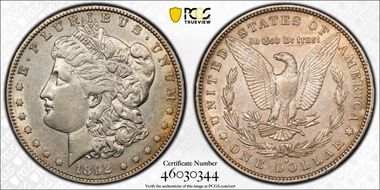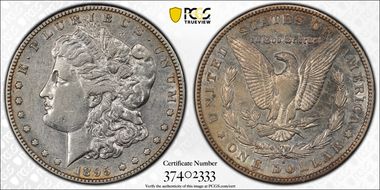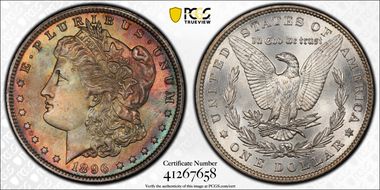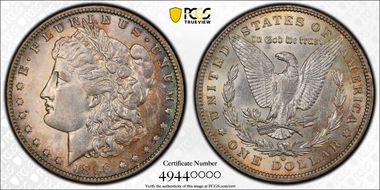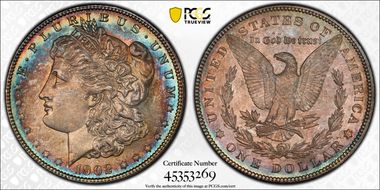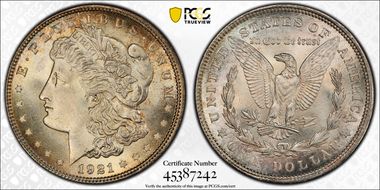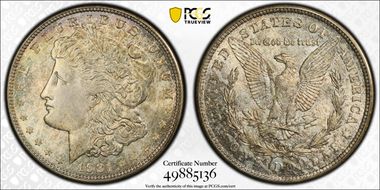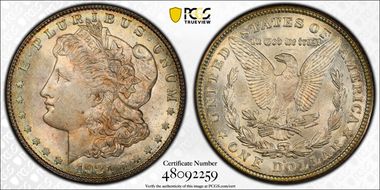Anablep 的钱币相册
Flashy olive and golden toned obverse and reverse of this CAC graded Morgan dollar.
Flashy olive and golden toned obverse and reverse of this CAC graded Morgan dollar.
CAC certified first year of issue, 1878 7/8 weak tail feathers with pastel colors evenly distributed on both the obverse and reverse.
Blue and brilliant on the obverse with a bulls eye blue, violet and gold on the reverse.
Blue and brilliant on the obverse with a bulls eye blue, violet and gold on the reverse.
Formerly in ANACS holder, this coin has some blue and orange toning around the edges of the obverse and reverse.
Formerly in ANACS holder, this coin has some blue and orange toning around the edges of the obverse and reverse.
Nice reflective fields on both the obverse and reverse with some rim toned blues and reds. Crossed over from ANACS MS65.
Nice reflective fields on both the obverse and reverse with some rim toned blues and reds. Crossed over from ANACS MS65.
Pleasing surfaces with warm russet and blue tone at the obverse rim and eye appealing red and golden at the reverse rim. The overall surfaces are particularly attractive for their luster.
Pleasing surfaces with warm russet and blue tone at the obverse rim and eye appealing red and golden at the reverse rim. The overall surfaces are particularly attractive for their luster.
Darker blue and orange toning covers both the obverse and reverse of this Carson City dollar sporting a rusted CC mint mark. The rusted version is often called the "Capped Die" or the "Capped CC." Of the two varieties, the non-rusted version is more common.
Formerly in ANACS holder, this coin has nice blue and orange toning around the edges of the obverse and reverse.
Formerly in ANACS holder, this coin has nice blue and orange toning around the edges of the obverse and reverse.
A flashy gem, rim toned in blue and purple, this Morgan was a crossover from an older ANACS holder.
A flashy gem, rim toned in blue and purple, this Morgan was a crossover from an older ANACS holder.
Nicely struck with heavy luster on the devices. Rings of blue and orange rim both the obverse and reverse.
Nicely struck with heavy luster on the devices. Rings of blue and orange rim both the obverse and reverse.
Rim toning in blue and orange surround the obverse devices while plum and violet fill 90% of the reverse of this MS64 graded coin. It is clear by the surviving population of 1880-O Morgan dollars that most of the 5.3 million coin mintage were released directly into circulation. Few were represented in the Treasury releases, which has made this coin exceptionally rare above MS64.
Rim toning in blue and orange surround the obverse devices while plum and violet fill 90% of the reverse of this MS64 graded coin. It is clear by the surviving population of 1880-O Morgan dollars that most of the 5.3 million coin mintage were released directly into circulation. Few were represented in the Treasury releases, which has made this coin exceptionally rare above MS64.
Ringed with blue, red and yellow, this gem Morgan dollar exhibits the classic album rim toned look.
Ringed with blue, red and yellow, this gem Morgan dollar exhibits the classic album rim toned look.
Wonderful wisps of silver stretch across predominantly orange-grey centers on the obverse, while concentric bands of red, orange, yellow, green, and blue radiate from the peripherals of this coin.
Wonderful wisps of silver stretch across predominantly orange-grey centers on the obverse, while concentric bands of red, orange, yellow, green, and blue radiate from the peripherals of this coin.
A rainbow of blues and reds frame lady Liberty above her head on the obverse of this clean and flashy Carson City Morgan dollar.
A rainbow of blues and reds frame lady Liberty above her head on the obverse of this clean and flashy Carson City Morgan dollar.
Formerly in ANACS holder, this coin has some blue, silver and orange toning around the edges of the obverse and reverse.
Formerly in ANACS holder, this coin has some blue, silver and orange toning around the edges of the obverse and reverse.
This fully superb gem, rim toned 1881-S looks as if it was struck yesterday. It is easily one of the nicest certified examples of this quintessential Morgan dollar date & mint combination. The 1881-S Morgan dollar is easily one of the most commonly encountered mint state Morgans today. By some estimations, perhaps a third of the original 12.7 million coin mintage exists today in mint state.
A flashy gem, rim toned in blue and purple on the obverse and PL on the reverse, this Morgan was a crossover from an older ANACS holder.
A flashy gem, rim toned in blue and purple on the obverse and PL on the reverse, this Morgan was a crossover from an older ANACS holder.
Album rim toning encircles the obverse and reverse in shades of blue and yellow.
Album rim toning encircles the obverse and reverse in shades of blue and yellow.
Bright, clean obverse, lustrous reverse. Some edge toning on both sides frames the devices of this nicely struck New Orleans issue. The 1882-O Silver Dollar is a common date but, because it comes from the New Orleans Mint, it is difficult to locate in Gem condition. The typical Mint State grade for an 1882-O Morgan Dollar is this grade, MS-63, reflective of the typical poor strike associated with this mint.
Bright, clean obverse, lustrous reverse. Some edge toning on both sides frames the devices of this nicely struck New Orleans issue. The 1882-O Silver Dollar is a common date but, because it comes from the New Orleans Mint, it is difficult to locate in Gem condition. The typical Mint State grade for an 1882-O Morgan Dollar is this grade, MS-63, reflective of the typical poor strike associated with this mint.
Lavender & orange toned areas on the obverse accent a clean, mark-free Liberty. The reverse is white.
Lavender & orange toned areas on the obverse accent a clean, mark-free Liberty. The reverse is white.
Described as "oyster shell" toning, this Morgan dollar has consistent golden and lavender toning on both the obverse and reverse giving it a skin of muted luster.
Described as "oyster shell" toning, this Morgan dollar has consistent golden and lavender toning on both the obverse and reverse giving it a skin of muted luster.
Blotchy, discontinuous toning on the reverse and obverse on this upgraded coin from MS64 ANACS to PCGS MS64+.
Blotchy, discontinuous toning on the reverse and obverse on this upgraded coin from MS64 ANACS to PCGS MS64+.
Rimmed with concentric rings of blue and orange, this New Orleans Morgan dollar exhibits a clean cheek and lacks distracting contact marks on all fields.
The 1883-S Morgan dollar is an issue that is usually well struck and high quality. However, the coins picked up many bag marks and abrasions due to years of improper storage in bags at the Treasury Department. Due to these abrasions, examples of this date are quite rare in the higher levels of mint state. This uncirculated San Francisco minted dollar displays tremendous luster, especially on the reverse, where a bright cartwheel flashes around full eagle breast feathers. The obverse possesses a subtle ring of orange toning around the devices.
Blue and russet album toning encircle the obverse and reverse exactly the way it should.
Blue and russet album toning encircle the obverse and reverse exactly the way it should.
Richly toned a pretty lavender-grey with stunning rainbow tints featured along the obverse rim and similar coloration more prevalent on the reverse of this New Orleans issue preserved in gorgeous premium gem condition.
Full rainbow of colors on the obverse starting at the rim and toward the center while a muted rainbow rims the reverse of this flashy dollar.
Full rainbow of colors on the obverse starting at the rim and toward the center while a muted rainbow rims the reverse of this flashy dollar.
Frosty gem Morgan dollar with a ring of gold on the obverse and a full rainbow of purple and orange glinting on the reverse.
Frosty gem Morgan dollar with a ring of gold on the obverse and a full rainbow of purple and orange glinting on the reverse.
Classic rim toning in blues, gold, and orange surround the edges of the obverse and reverse of this very clean MS67 Morgan dollar. The strike of this 1885-O dollars is better than average. Though it is more sharply struck than the vast majority of coins of this date, its luster is more greasy and less like a cartwheel. It replaces an MS64 that lacks the clean check and fields of this coin, but has better luster and equal rim toning.
Flashy luster and rings of blue & orange encircle the obverse and reverse.
Flashy luster and rings of blue & orange encircle the obverse and reverse.
This 1886 dollar is very well struck and has a more satiny or "greasy" luster rather than deeply frosty luster. With a light rim of orange color surrounding blast white devices, the eagle's breast feathers at the center of the reverse are nearly well-struck. The mintage of the 1886-P Morgan dollar is just under 20 million coins. While some were released at the time of striking, many survived untouched in original mint bags until the mid 20th century. Due to this, the 1886-P Morgan dollar is one of the most common in uncirculated grades today, with nearly 1000 equal in grade to this MS67 example. CAC approved.
Bold orange, violet, and blue surround the design on both the obverse and reverse of this CAC-certified, lower mintage S-mint coin. The San Francisco Mint produced the smallest number of silver dollars in 1886 of any year since the inception of the Morgan series. MS-64 coins are somewhat scarce and this issue is nearly always well struck.
Ridiculous orange toned centers with blue-silver rims on both the obverse and reverse, as both sides of the coin matches in color, luster and strike. The luster is a bit satiny or "greasy," on the dull side, rather than deeply lustrous and frosty, but the color more than makes up for the lack of flashy surfaces. The Philadelphia Mint struck over 20 million Morgan dollars in 1887.
Nice ring of blue and orange toning around the obverse and reverse of this New Orleans issue.
Nice ring of blue and orange toning around the obverse and reverse of this New Orleans issue.
Light peripheral toning around the date highlight this super clean S-mint coin. A real stunner.
Light peripheral toning around the date highlight this super clean S-mint coin. A real stunner.
Formerly in ANACS holder, this coin has moderate blue, plum and orange toning around the edges of the obverse and reverse.
Formerly in ANACS holder, this coin has moderate blue, plum and orange toning around the edges of the obverse and reverse.
A thick blue crescent adorns the obverse while peripheral rim toning highlights the reverse...
A thick blue crescent adorns the obverse while peripheral rim toning highlights the reverse...
The 1888-S is one of the scarcer Morgan dollars of its era. MS-64 1888-S dollars are scarce, with an estimated population of 3,000 to 5,000. This coin is frosty at the center with colorful rings of blue and orange toning along the rims.
Concentric rings of blue, orange and gold hem the obverse and reverse of the periphery of this clean MS64 Morgan dollar.
Concentric rings of blue, orange and gold hem the obverse and reverse of the periphery of this clean MS64 Morgan dollar.
Blue, orange and gold rim the obverse and reverse in a nearly continuous circle of color and flash on this CAC reviewed, nearly gem New Orleans Morgan dollar.
Blue, orange and gold rim the obverse and reverse in a nearly continuous circle of color and flash on this CAC reviewed, nearly gem New Orleans Morgan dollar.
Blue, orange and gold rim the obverse and reverse in a nearly continuous circle of color and flash on this CAC reviewed, nearly gem New Orleans Morgan dollar.
Blue, orange and gold rim the obverse and reverse in a nearly continuous circle of color and flash on this CAC reviewed, nearly gem New Orleans Morgan dollar.
This date is tough to find without bagmarks and scuffs. This example displays rim toning in blue and umber along the obverse and reverse. Liberty's cheek is clean. CAC approved...
This date is tough to find without bagmarks and scuffs. This example displays rim toning in blue and umber along the obverse and reverse. Liberty's cheek is clean. CAC approved...
Nice, sharply struck lustrous Carson City issue with light golden toning on the obverse surface.
Nice, sharply struck lustrous Carson City issue with light golden toning on the obverse surface.
Target rim toned in blue and ochre framing the obverse and reverse, especially on the left side of the coin. Typical mushy strike for this issue.
Target rim toned in blue and ochre framing the obverse and reverse, especially on the left side of the coin. Typical mushy strike for this issue.
Target rim toned in blue and ochre framing the obverse and reverse, especially on the left side of the coin. Typical mushy strike for this issue.
Rainbow toning rings the obverse while a deeper plum and orange mingles with the devices on the reverse.
Rainbow toning rings the obverse while a deeper plum and orange mingles with the devices on the reverse.
Most 1892-CC dollars are well struck. This nice AU rim toner still possesses tons of luster and flash. Although the mintage of the 1892-CC exceeded that of 1882-CC, 1883-CC, and 1884-CC, it is much more elusive in uncirculated grade, due to the relatively small amount of hoard coins remaining.
Since the striking quality is usually poor on the average 1892-O, with most surviving coins lightly struck over Miss Liberty's ear and lack of breast feathers on the eagle, this is a rather tough coin to find with a decent strike. In the hurry to coin as many dollars as possible with the smallest amount of effort, technicians at the New Orleans Mint spaced the dies too far apart. Among all Morgan dollars, the 1892-O is one of the most notorious for being flatly struck at the centers. This particular coin possesses a vibrant ring of blue and red, which frame the obverse in a typical target toned pattern, which is the object of each coin in this set.
Since the striking quality is usually poor on the average 1892-O, with most surviving coins lightly struck over Miss Liberty's ear and lack of breast feathers on the eagle, this is a rather tough coin to find with a decent strike. In the hurry to coin as many dollars as possible with the smallest amount of effort, technicians at the New Orleans Mint spaced the dies too far apart. Among all Morgan dollars, the 1892-O is one of the most notorious for being flatly struck at the centers. This particular coin possesses a vibrant ring of blue and red, which frame the obverse in a typical target toned pattern, which is the object of each coin in this set.
This evenly circulated coin shows flashes of AU level luster and enough peachy toning on both sides to merit an XF45 grade. Only 1.2 million 92-S Morgans were minted and many circulated coins of this date were melted in 1918 making it a scarce coin in the series.
Ring of Blue and orange surround the obverse devices on this AU Morgan dollar.
Ring of Blue and orange surround the obverse devices on this AU Morgan dollar.
Muted luster and toning on the obverse, flashy luster with muted orange on the reverse.
Muted luster and toning on the obverse, flashy luster with muted orange on the reverse.
The 1896 is the most common Morgan dollar of the 1890s and is plentiful in all circulation strike grades. Finding one with unique toning and a sharp strike at a high grade was important in making this purchase. This coin exhibits plum and aqua colors along the obverse while the reverse is blast white with strong breast feathers on the eagle. This coin has been stickered by CAC, designating agreement with PCGS's assessment of the coin's authenticity and grade.
Blue and orange circle both obverse and reverse of this typically flat struck but better-than-average in luster, AU Morgan dollar.
Nicely rim toned on both the obverse and reverse, this coin demonstrates the typical russet, blue and plum toning pattern of this series.
Nicely rim toned on both the obverse and reverse, this coin demonstrates the typical russet, blue and plum toning pattern of this series.
Blue rims highlight the obverse and reverse of this almost uncirculated New Orleans issue.
Nice peripheral toning with orange hues extending along the obverse and reverse rims.
Nice peripheral toning with orange hues extending along the obverse and reverse rims.
Originally in an ANACS MS64 holder, this lustrous, colorful Morgan dollar has upgraded to an MS65 holder.
Clean, rim toned Morgan dollar in orange and blue shows a New Orleans mintmark punched over a Carson City Mintmark. A common variety, but a fun issue nonetheless.
Clean, rim toned Morgan dollar in orange and blue shows a New Orleans mintmark punched over a Carson City Mintmark. A common variety, but a fun issue nonetheless.
Rim toning in blue and russet accents the obverse of this Morgan Dollar. This is a difficult date to find nicely toned.
Rim toning in blue and russet accents the obverse of this Morgan Dollar. This is a difficult date to find nicely toned.
Tough date Morgan dollar, this coin is toned with blue and orange fields on both the obverse and reverse.
Tough date Morgan dollar, this coin is toned with blue and orange fields on both the obverse and reverse.
Tough date Morgan dollar, this coin is toned with blue and orange fields on both the obverse and reverse.
Tough date Morgan dollar, this coin is toned with blue and orange fields on both the obverse and reverse.
Nice reverse rim toning in blue and gold. Minor planchet striations run horizontally across Liberty's cheek which are common for this issue.
Vibrant blue toning frames the more muted central areas of this gem Morgan dollar. Most uncirculated dollars of this date are satiny rather than deeply frosty.
The 1902-S is one of the scarcer San Francisco Mint entries in the Morgan dollar series, many of the 1,530,000 coins produced likely melted pursuant to the terms of the 1918 Pittman Act. Even so, thousands of Mint State examples came to light through government distributions from the 1920s through the early 1950s. Obtainable with relative ease in lower uncirculated grades, if still scarce by the standards of the type, the 1902-S remains a formidable condition rarity as an upper end Gem. This coin exhibits nice rim tones that are beginning to appear as golden orange tints on the obverse and reverse. CAC approved.
The 1902-S is one of the scarcer San Francisco Mint entries in the Morgan dollar series, many of the 1,530,000 coins produced likely melted pursuant to the terms of the 1918 Pittman Act. Even so, thousands of Mint State examples came to light through government distributions from the 1920s through the early 1950s. Obtainable with relative ease in lower uncirculated grades, if still scarce by the standards of the type, the 1902-S remains a formidable condition rarity as an upper end Gem. This coin exhibits nice rim tones that are beginning to appear as golden orange tints on the obverse and reverse. CAC approved.
Subtle toning on obverse along the rim on this circulated example of a tough S-mint dollar.
What this coin lacks in luster, it makes up for in color. Exhibiting deep plums, blues and pinks on both the obverse and reverse, the near-terminal toning of this coin pops when held at the correct angle in the light. Nicely struck and free of any marks on the cheek, this Morgan dollar is the rare exception to the rule for this date. Most coins of this issue have a subdued gray luster that is often dull and unattractive with poor to average stike at best. This coin demonstrates none of those characteristics. CAC approved.
What this coin lacks in luster, it makes up for in color. Exhibiting deep plums, blues and pinks on both the obverse and reverse, the near-terminal toning of this coin pops when held at the correct angle in the light. Nicely struck and free of any marks on the cheek, this Morgan dollar is the rare exception to the rule for this date. Most coins of this issue have a subdued gray luster that is often dull and unattractive with poor to average stike at best. This coin demonstrates none of those characteristics. CAC approved.
Blue rim toning is featured on the reverse of this Morgan Dollar while gold, russet and blue highlight the rim near Liberty's cap on the obverse.
Blue rim toning is featured on the reverse of this Morgan Dollar while gold, russet and blue highlight the rim near Liberty's cap on the obverse.
Nice AU example of a tough date with just a whisp of toning along the obverse rim above Liberty's portrait.
Nice AU example of a tough date with just a whisp of toning along the obverse rim above Liberty's portrait.
Most 1921 Morgan dollars are poorly struck and quite unappealing. This coin may be an exception. With light toning on the obverse and reverse and a decent, though typically shallow strike, this MS66 dollar is better looking than most other 1921s.
Flashy, clean, and colorful, this 1921-D Morgan is struck from redesigned shallow-relief dies though the surfaces are frosty and lustrous. Morgan had to recreate entirely new master dies for the 1921 issue, which explains why the 1921 Morgan dollars look very different from the earlier issues. Some 20.3 million Morgans were struck in Denver in 1921. Like the San Francisco and Philly issues, this was a record number that was never broken. Quality was better in Denver than San Francisco, and this issue is readily available in gem and above. The D mintmark is tiny on this coin, as is the case with all issues. CAC approved.
Nicely toned and brightly lustrous, this final dollar of the Morgan run is typically struck with abraded surfaces, with the high points of the design slightly bagmarked. Almost 21.7 million Morgans were struck in San Francisco this year, the most silver dollars ever struck in a year in San Francisco. The coins are very common today, but fully struck examples with good luster can be hard to locate. The coins are available in gem, but do bring a large premium to lesser quality coins. Overall, 65+ is a difficult grade to attain for this date and mint. CAC approved.
Nicely toned and brightly lustrous, this final dollar of the Morgan run is typically struck with abraded surfaces, with the high points of the design slightly bagmarked. Almost 21.7 million Morgans were struck in San Francisco this year, the most silver dollars ever struck in a year in San Francisco. The coins are very common today, but fully struck examples with good luster can be hard to locate. The coins are available in gem, but do bring a large premium to lesser quality coins. Overall, 65+ is a difficult grade to attain for this date and mint. CAC approved.






















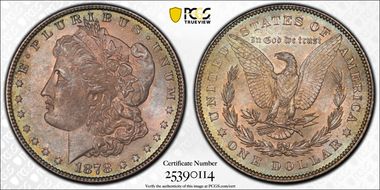










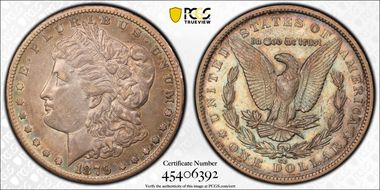






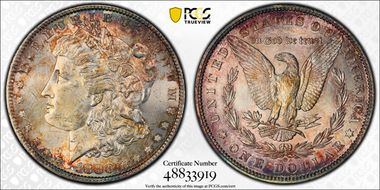









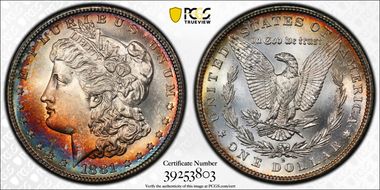












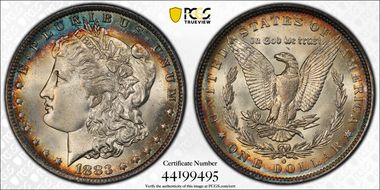
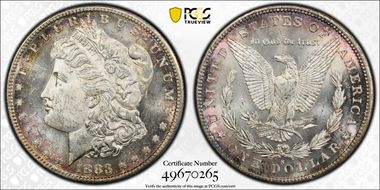




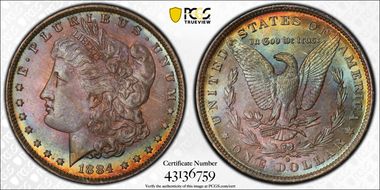




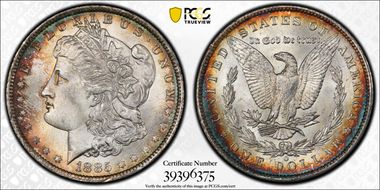


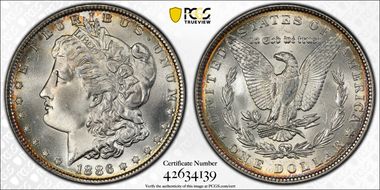


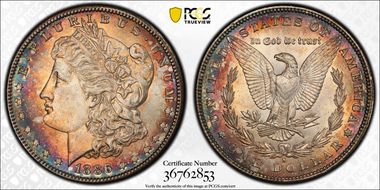
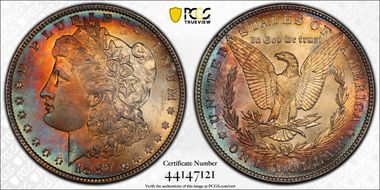








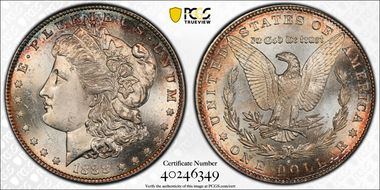


















_album.jpg)
_album.jpg)
